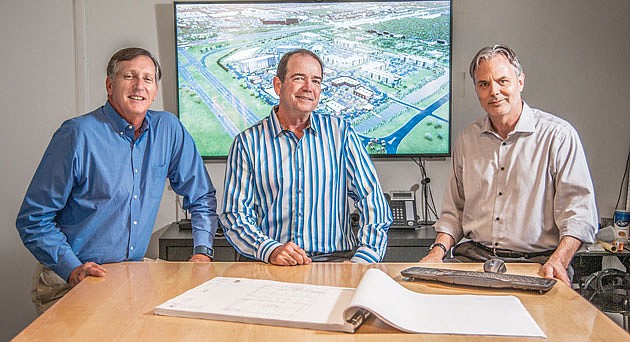- November 24, 2024
-
-
Loading

Loading

It's a blank slate now, but enter a virtual world, and an entire neighborhood comes to life.
Plans for a 41-acre parcel of land at Fruitville Road and Interstate 75 in Sarasota call for retail, office space, apartments and a hotel in a development dubbed Fruitville Commons. The project is part of a larger initiative to redevelop the area adjacent to I-75 at Fruitville Road.
The Fruitville Commons property, owned by the family of David Walters in a trust, was once the potential site of a Bass Pro Shops. When that deal fell through, Walters went back to the drawing board.
To rework plans, Walters turned to Hoyt Architects. Hoyt and the associated Hoyt Architecture Lab developed virtual reality technology that helped frame the development in a new way.
The software Hoyt developed allows the design team, public officials, the client and prospective tenants to see the plans in a life-like way.
“The technology shows what the project can be,” says Hoyt Architects President and Director of Design Gary Hoyt. “People see the same thing — it's a common language.”
Often, visualization is used later in the development process as a marketing tool. The Fruitville Commons project turned that notion on its head, involving virtual reality early in the initial design.
“We can do in this what you can do with a drone, but you don't have to go to the same place,” Hoyt says. “You can go down the street and say, 'I want to change this.'”
The visualization also allows people to more easily see the first level of structures in the development, including people walking around the street, cars parked in front of retail buildings and trees waving in the breeze.
All aspects of the development are visible through virtual reality, including about 100,000 square feet of Class A office space, a likely 80,000 square feet of retail, a four- or five-story hotel with 120 to 150 rooms, 300 apartment units and a 1-acre park in the center of it all. The design aims to avoid sprawl and create a walkable, downtown-like neighborhood.
Loyd Robbins, principal broker at Harry E. Robbins Associates Inc., is the real estate broker connected with the project. He says they've started talking to potential tenants, and Stock Development of Naples is attached to apartment portion of the project. Robbins is also talking with potential hotel operators.
Unlike a static rendering, the technology allows potential tenants to see what their company's signage would look like on a building. “Every time a potential tenant is considered, you can alter the virtual reality,” Hoyt says. “Visualization lets you see context and the surrounding area.”
With other technologies, this isn't the case. “Once you do a video or animation, it's done,” Hoyt says. “You watch it over and over, and it's a yawn.” But with digital model-driven virtual reality, viewers are looking at the development in real time.
Walters calls it a 21st century design idea for the development world. “It's an old guy business,” Walters says. “They don't want to do this. This is a new breed. This is cutting edge.”
Construction plans for Fruitville Commons are expected to be submitted to the county for approval by the end of the month. The team is aiming for a December groundbreaking and to have site work finished in April.
Walters plans to sell pieces of the property, such as the office space, to others. “We feel it's imperative to bring in professionals who have expertise in those areas to be the primary developer of them,” Robbins says. Walters and his family may stay involved as a joint-venture partner on some of the parcels in the development, but specific plans are still to be determined. “We thought it would be important to do a lot of upfront design work to show buyers what they could do,” Robbins says.
The build-out timetable is hard to determine because of other players involved. “It could go fast, or it could go slow,” Robbins says. “It's like planning and building a mini town.”